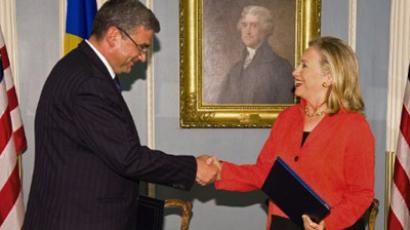AMD ‘un-resets’ Washington’s relations with Moscow
Russia has repeatedly voiced its concern about the US missile defense program in Europe. Journalist Pepe Escobar, while doubting the system’s capabilities, says Moscow has every right to be worried.
Escobar, a correspondent with Asia Times Online, declared that the recent anti-missile defense agreement the US signed with Romania was “un-resetting the relationship” with Moscow.“Nobody knows if the anti-missile defense works,” he told RT. “It is a multi-billion, almost trillion, dollar program. It is typical of keeping the industrial-military complex running.” The story has not changed over the last 10 years – Washington is still trying to encircle Russia, claimed Escobar. And Russia’s concerns that the shield is aimed against it are absolutely valid, he said.“Some of the best military strategists in the world are in Russia,” says Escobar. “They know that Iran, first of all, does not have the capabilities to attack Europe even if they wanted to. And, number two, they may be a very hard line regime, but they are not suicidal. So this excuse against Ahmadinejad is ridiculous.”The potential for an arms race depends on Russia’s reaction to Washington, he predicted. The AMD tests have not been successful so far, so anything really dangerous for Moscow is not expected to emerge from the system for at least seven years, he concluded. The recent spike in activity has highlighted Washington’s commitment not only to press ahead with the European missile defense shield project, but also to extend and reinforce it, despite indicating two years ago that it wanted to abandon the scheme. That is the view of Rick Rozoff, an international affairs expert from the “Stop NATO” movement.Rozoff adds that American claims of a threat from North Korea or Iran are purely fictitious. “What we’re talking about is a potential jump to the first-strike system,” the expert says. “This means that in the event the US or its NATO allies would launch what they would describe as a ‘pre-emptive’ strike – but in reality a first strike – against a nation like Russia, the created missile defense system will work to ensure that any missiles surviving this ‘pre-emptive’ attack could not threaten retaliation,” he explains.“It is not defense,” Rick Rozoff concludes, meaning that from the geographical standpoint, the positioning of the rockets makes no sense as they will not effectively intercept threats from either Pyongyang or Tehran.














